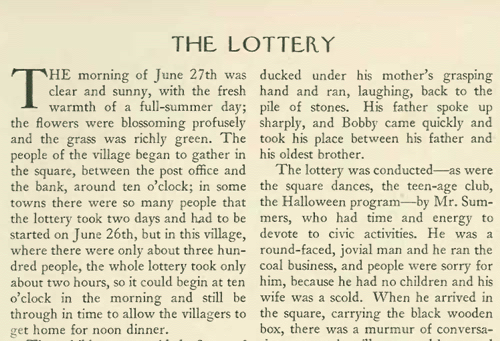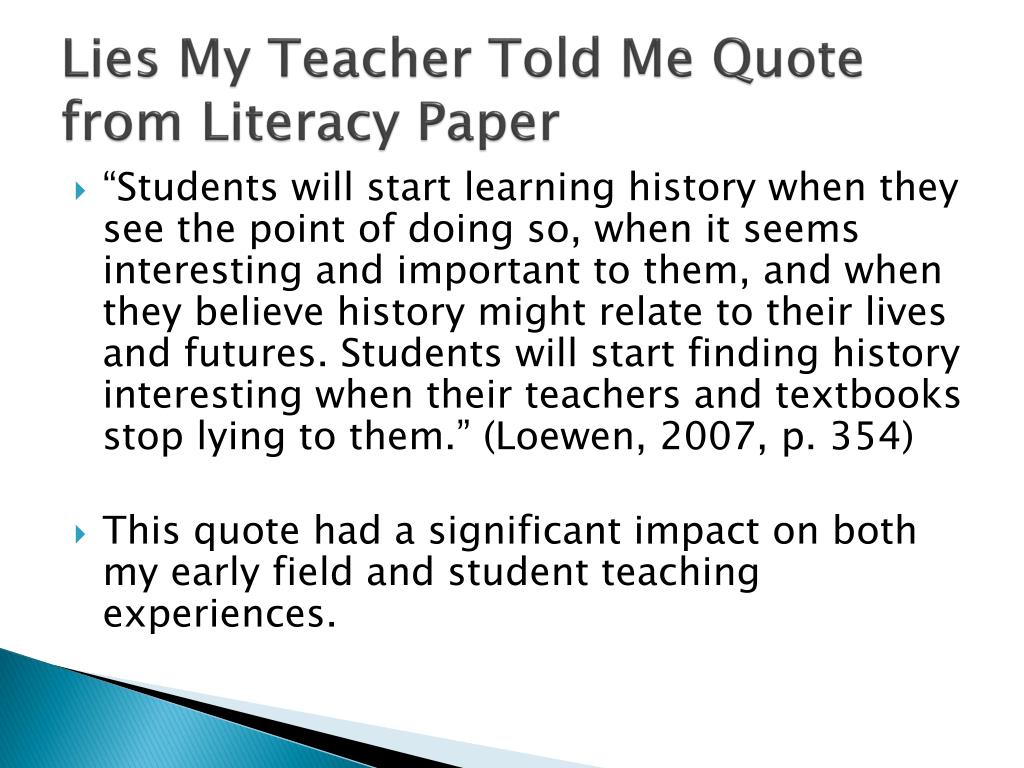
WebThe Lottery Essays Plot Overview The villagers of a small city collect collectively in the rectangular on June 27, a stunning day, for the metropolis lottery. In different cities, the WebThe Lottery, a short story written by famous writer Shirley Jackson, created an uproar on June 26, , when it was published in the magazine The New Yorker (Ball). The gothic Web“The Lottery” by Shirley Jackson tells a story about a village that has a long-standing, dark tradition called “the lottery.” Shirley Jackson was born in in San Francisco to very
The Lottery Essay Examples - Free Research Papers on blogger.com
The Lotterya short story by Shirley Jackson, developed the themes of adherence to meaningless the lottery essays, parenting and scapegoating. The broad aftermath and the negative responses of the readers who did not see the line between fiction and reality prove that the plot of the short story The Lottery by Jackson reflects the real problems of the modern community. The plot of the story depicts a two hours lottery in a small town which finishes with a ritualistic death ceremony of stoning the unlucky participant as a sacrifice for ensuring a better harvest. At the beginning of the short story, the village children walk around collecting stones. Summers who runs the lottery mixes the slips of paper in a black box, checks if everyone is in place and invites the heads of the families to draw the papers.
When it clears out that Bill Hutchinson gets the unlucky slip, his wife Tessie starts protesting saying that her husband had not enough time for making his choice and the lottery is not fair. Then, each member of the Hutchinsons family selects a slip of paper, and Tessie draws a slip with a black dot on it. Then, the villagers throw their stones into Tessie as a part of their death ritual. The fact that Tessie does not question the rite itself, but protests the lottery essays the choice of her family emphasizes the idea of adherence to tradition as the major theme of the short story. The rite is regarded as sacred and the idea of doubting it does not occur to anybody.
When Mrs. Adams admits that the ritual of the lottery has already been abandoned in other villages, the lottery essays, Warner as the eldest man in this community answers that giving up the rite can cause only troubles. For instance, the Nazis scapegoated the Jewish people, proclaiming them the the lottery essays of their troubles. Regardless of the current societal progress, modern people frequently scapegoat sexual and ethnical minorities, blaming them for the current moral decay and other social problems, the lottery essays. The social phenomenon of scapegoating is rooted deep in public consciousness and tradition according to which the dominating social group looks for the opportunities of self-affirmation and shifting the responsibility for their problems on the others.
Though the ritual of stoning to death has certain historical basis, its meaning is rather symbolical and should not be taken literally by modern readers. The examples of scapegoating the others, including the limited rights of the lottery essays for finding a good job and the so-called glass ceiling due to which women receive lower salaries than men doing the same job and have lower chances for the lottery essays promotion clearly represent the phenomenon of scapegoating in modern community. After the short story was published in The New Yorker inthe author received hundreds of hostile letters from the lottery essays readers objecting to the brutal ending of the story, the lottery essays.
The debates concerning the actual location of these rites prove that the line between the fiction and reality as perceived by the readers appeared to be unclear. Hypocritically concealing their fear of becoming a scapegoat, not feeling empathy with Tessie Hutchinson who becomes a victim and not having moral strength and common sense to abandon the meaningless rite, the characters of the short story have a strong resemblance to modern readers, the lottery essays. Thus, the plot of the short story can be regarded as the exaggerated reflection of the phenomenon of scapegoating as the imaginary solution the lottery essays the real problems of the modern community.
Hattenhauer, Darryl. State University of New York Press, Murphy, Bernice. Shirley Jackson: Essays on the Literary Legacy. Need a custom Essay sample written from scratch by professional specifically for you? Learn More. You are free to use it for research and reference purposes in order to write your own paper; however, you must cite it accordingly. Removal The lottery essays. If you are the copyright owner of this paper and no longer wish to have your work published on IvyPanda. Henry David Thoreau: A Challenge to Become Better The two views of the Mississippi. GET WRITING HELP. Cite This paper. Copy to Clipboard Copied! APA-7 APA-6 Chicago N-B Chicago A-D MLA-9 Harvard. Reference IvyPanda. Work Cited ""The Lottery" by Shirley Jackson, the lottery essays.
Bibliography IvyPanda. References IvyPanda. Powered by CiteTotal, easy citation maker. More related papers, the lottery essays. Check the price of your paper.
Literary Analysis of “The Lottery” by Shirley Jackson - Free Essay Sample
, time: 5:31The Lottery Essays

WebThe Lottery Essays Plot Overview The villagers of a small city collect collectively in the rectangular on June 27, a stunning day, for the metropolis lottery. In different cities, the WebThe Lottery, a short story written by famous writer Shirley Jackson, created an uproar on June 26, , when it was published in the magazine The New Yorker (Ball). The gothic WebThe Lottery is a short story by Shirley Jackson which first appeared in in the New Yorker. The story is classified in the modern parable as a horror story that narra 3

No comments:
Post a Comment